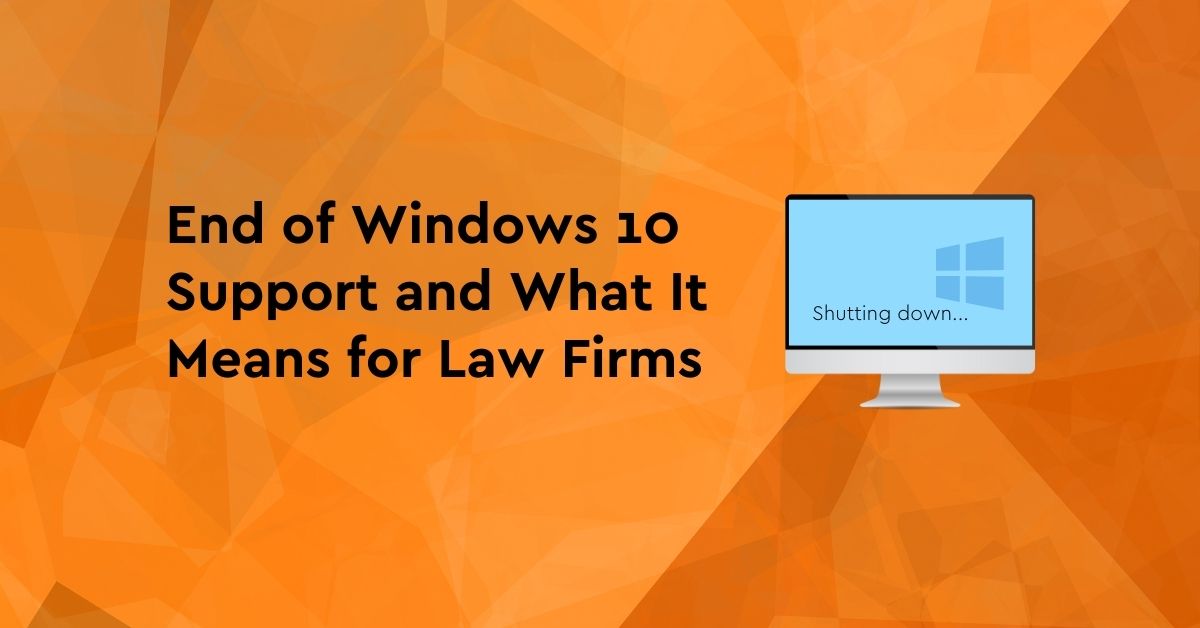On 14th October 2025, Microsoft will officially end support for Windows 10. This means no more security updates, feature improvements, or technical assistance for devices running this operating system. While devices will continue to function, law firms have a professional responsibility to ensure their IT systems remain secure, reliable, and aligned with the SRA’s regulatory expectations, particularly regarding SRA IT compliance.
This is an excellent opportunity for firms to review their IT strategy, adopt modern technologies, and reinforce their approach to data security and business continuity.
The Solicitors Regulation Authority (SRA) requires law firms to maintain adequate systems and controls to safeguard client information, ensure operational resilience, and mitigate risks related to technology. While the SRA does not mandate specific software versions, continuing to operate on unsupported platforms may challenge a firm’s ability to demonstrate that it meets these obligations.
Law firms process vast amounts of sensitive client information daily, from financial to matter details. The SRA standards, while not prescribing specific operating system or technology, emphasise that firms must implement IT systems that safeguard this data and support compliant practice. Key considerations include:
Data Protection and GDPR Compliance
The SRA expects law firms to maintain robust data protection practices, in line with GDPR. This includes implementing technical safeguards such as encryption, access controls, and timely security updates. Once Windows 10 reaches end-of-life, vulnerabilities will no longer be patched, leaving client data at risk of unauthorised access, corruption, or loss. For law firms, this could lead to regulatory scrutiny, fines, and reputational damage.
Cybersecurity and Threat Mitigation
Cybersecurity remains a top concern for legal practices. The UK legal sector has witnessed a growing number of cyberattacks, including ransomware and phishing attempts targeting law firm networks. Unsupported operating systems like Windows 10 are a prime target for attackers, who exploit known vulnerabilities. Maintaining SRA IT compliance requires adopting secure, supported platforms to protect sensitive client and business data.
Confidentiality and Ethical Obligations
The SRA requires firms to protect client confidentiality at all times. Using unsupported IT systems may compromise secure communication, case management, and document handling. Cybersecurity breaches or system failures can inadvertently expose confidential information, placing firms in breach of their professional obligations.
Information Management and Record Keeping
Modern law firms rely heavily on electronic records. The SRA expects firms to store, retrieve, and manage electronic information in a secure, structured manner. Unsupported systems may fail to run critical document management software or may suffer from compatibility issues, impacting accurate record-keeping and reporting.
Business Continuity
End-of-life operating systems increase the likelihood of operational disruptions. Without security patches, IT failures can escalate into prolonged downtime, affecting client service, court deadlines, and overall business continuity. SRA regulations expect firms to have robust contingency and disaster recovery plans, which are best supported by up-to-date IT systems.
Operational and Compliance Risks of Continuing with Windows 10
Law firms continuing to operate on Windows 10 beyond October 2025 face multiple risks:
- Security Vulnerabilities : Hackers increasingly target outdated software. Without updates, critical flaws remain exploitable, increasing the risk of ransomware, data breaches, and malware infections.
- Non-Compliance with SRA IT Requirements : Using unsupported software undermines SRA IT compliance and could affect audit readiness. It also exposes firms to GDPR non-compliance, with potential fines and regulatory consequences.
- Software and Hardware Compatibility Issues : Critical legal and productivity applications may fail or underperform on Windows 10, limiting workflow efficiency and access to modern features, including AI-based legal tools.
- Technical Support Limitations : Post-October 2025, Microsoft will no longer provide support for Windows 10. Law firms may find troubleshooting increasingly difficult, resulting in extended downtime and higher IT support costs.
- Financial Implications : Security breaches, data loss, and operational inefficiencies can result in significant financial consequences, from remediation costs to client compensation or regulatory penalties.
Law firms should begin planning now to mitigate these risks. Options include:
- Upgrading to Windows 11 provides enhanced security, performance, and compatibility with modern legal and business software. Windows 11 includes built-in protections like secure boot, hardware-based isolation, and advanced malware resistance, which support SRA IT compliance objectives.
- Cloud-Based or Virtual Desktop Solutions with platforms like Windows 365 offer secure, flexible environments. Cloud solutions can simplify IT management, enhance collaboration, and support remote work while ensuring compliance with SRA and GDPR standards.
- Extended Security Updates (ESU) are Available for eligible Windows 10 systems, ESUs provide temporary security coverage. While this buys time, it should only be considered a short-term measure before transitioning fully to supported systems.
- Hardware Assessment of Older devices may not be compatible with Windows 11. Firms should inventory hardware, consider upgrades or replacements, and ensure all devices support secure, modern IT operations.
Strategic Planning for Migration
A successful migration requires more than installing a new operating system. Law firms should adopt a phased, risk-managed approach, including:
- Comprehensive IT audits to assess current systems, software, and hardware compatibility.
- Phased migration plans to minimise disruption to operations and client service.
- Training and support for staff to ensure smooth adoption of new systems.
- Review and reinforcement of cybersecurity policies and procedures to maintain SRA IT compliance.
The end of Windows 10 support represents a critical juncture for law firms in the UK. Ignoring this deadline exposes firms to cybersecurity threats, operational inefficiencies, compliance risks, and financial consequences. Early planning allows for a cost-effective, seamless transition while maintaining SRA IT compliance and protecting client data.
At Onetechuk, our team of IT specialists provides managed IT services specifically tailored for the legal sector. We support law firms in achieving SRA-aligned IT practices, secure infrastructure, and smooth migrations to modern platforms. From IT audits to migration planning and ongoing management, we ensure your firm remains secure, efficient, and fully compliant.
Contact us today to discuss how we can help your firm transition to Windows 11, maintain SRA IT compliance, and future-proof your IT environment.


